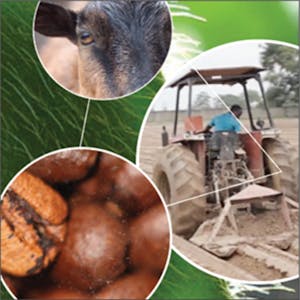The UN predicts we will be 9-10 billion people on Earth in 2050. Providing so many people with nutritious foods is a massive challenge and one that cannot be met by simply upscaling current practices regarding food production and consumption. Providing humanity with nutritional food is at the center of all decisions related to sustainable development.Agriculture is responsible for 80% of global deforestation. The food systems release 29% of global greenhouse gasses. We use an area equivalent to North and South America combined for the production of meat for consumption or to produce the food necessary to feed the animals we eat. 70% of fresh water use is related to agriculture. These figures are staggering, and they show us, that we need to rethink and transform the way we produce, distribute and consume food worldwide.
This course focuses on how food systems can become more sustainable. It consists of four modules where each focuses on an essential ingredient towards developing more sustainable food systems: (1) Boosting the small, (2) Transforming the big, (3) Losing less and (4) Eating smarter. In each of these key areas, we will meet people from different countries around the world, who labor every day to find and spread solutions that work.
Connecting the challenges that must be overcome to develop a sustainable global food system with the solutions being developed by the amazing group of people you meet in this course has been a huge source of inspiration for me. I truly believe that the global food system can be transformed to sustainably meet the needs of 9-10 billion people and, with this course, I dare you to join me!
None
Syllabus
Syllabus - What you will learn from this course
Week 1
Introduction to the Global Food System
Week 2
Boosting the Small
Week 3
Transforming the big
Week 4
Losing less
Week 5
Eating Smarter
Week 6
Conclusion: What does transformation really mean?
FAQ
When will I have access to the lectures and assignments?
Access to lectures and assignments depends on your type of enrollment. If you take a course in audit mode, you will be able to see most course materials for free. To access graded assignments and to earn a Certificate, you will need to purchase the Certificate experience, during or after your audit. If you don't see the audit option:
What will I get if I purchase the Certificate?
When you purchase a Certificate you get access to all course materials, including graded assignments. Upon completing the course, your electronic Certificate will be added to your Accomplishments page - from there, you can print your Certificate or add it to your LinkedIn profile. If you only want to read and view the course content, you can audit the course for free.
Is financial aid available?
Yes. In select learning programs, you can apply for financial aid or a scholarship if you can’t afford the enrollment fee. If fin aid or scholarship is available for your learning program selection, you’ll find a link to apply on the description page.
Reviews
Very substanstial course 😍 I enjoyed the content so much. Its not like a typical course where teacher is teaching the subject matter. In here, its like you're watching a documentary 😍
Eye-opener and inspirational. Gives you an in depth view of the world's agricultural system and food value chain. Learned lots of lessons from this course!
Great course! I never imagined that a course with this level is here in Coursera. Take advantage of this course, learn and improve the world by agriculture and nature
An excellent course. I highly recommend taking this course for someone who needs to gain an understanding of Food systems in a sustainability context.
